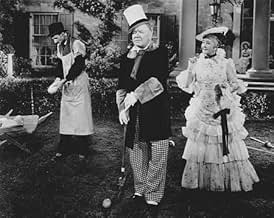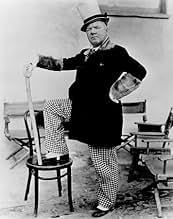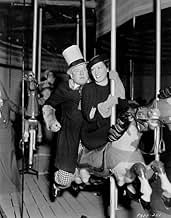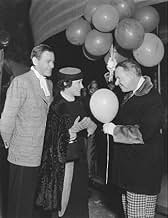Ajouter une intrigue dans votre langueCarny con artist and snake-oil salesman Eustace McGargle tries to stay one step ahead of the sheriff but is completely devoted to his beloved daughter Poppy.Carny con artist and snake-oil salesman Eustace McGargle tries to stay one step ahead of the sheriff but is completely devoted to his beloved daughter Poppy.Carny con artist and snake-oil salesman Eustace McGargle tries to stay one step ahead of the sheriff but is completely devoted to his beloved daughter Poppy.
- Réalisation
- Scénario
- Casting principal
- Countess Maggi Tubbs DePuizzi
- (as Catharine Doucet)
- Carnival sword swallower
- (non crédité)
- Boy
- (non crédité)
- Bit part
- (non crédité)
- Young woman
- (non crédité)
- Gardener
- (non crédité)
- Bartender
- (non crédité)
- BIT part
- (non crédité)
Avis à la une
The 1925 "Sally of the Sawdust" had some good moments when Fields did his larcenous best - including a "heroic" scene at the end where he explains "Sally"'s true parentage at court, and saves her from prison. But Dempster's attempts at "gamin" like cuteness are tiresome to a viewing today. Lunt does well, but is a distinctly supporting actor here.
Fortunately sound came along, so that Mr. Lunt (now with Lynn Fontaine) would make THE GUARDSMAN and plenty of television appearances in the future to demonstrate their fine acting abilities. Ms Dempster, of course, just faded into oblivion. Fields too would benefit by sound, and would leave us that nasal twang that made us guffaw so much. And by doing "Poppy" as a sound film we were able to hear some of the dialog from the stage play that the silent film did not have. Mention has been made of three moments: the sale of the "talking dog", the business with the hot dog vendor (which is where the line at the start of this review comes from), and the business with the patent medicine purchaser ("No more"). A fourth one is the sequence (somewhat too brief) where "Professor" McGargle entertains the guests at a society party with some high sounding concerto on a strange looking stringed instrument. He ends up playing "Pop Goes the Weasel". At the end, when "Poppy" is revealed to really be the lost heiress, McGargle takes leave of his adopted daughter in a quiet, dignified way - not quite as tragic as a similar sequence in THE OLD FASHIONED WAY, perhaps, but equally not as tragic and total as his leaving her in the radio version of "Poppy" that was made within two years of the film. That version was put out on records about 1970, and keeps to the story, but seems sadder than this movie or the 1925 silent version.
This version of Poppy has Fields with daughter Rochelle Hudson as part of a traveling carnival that stops in one of the small towns where she falls for the son of the mayor Granville Bates. The son is played by Richard Cromwell. She falls hard too, but Fields see an opportunity for a really big con by passing her off as the daughter of one of the town's leading citizens who left and married a carnival man years ago and left a daughter unaccounted for.
There's a rival claimant in Catherine Doucet who was a cousin of the heiress and she's being stage managed by Lynne Overman as shrewdly as Fields is doing for his daughter. I can't say more, but some unexpected facts come to everyone's attention in the end.
The original story of Poppy was written by Dorothy Donnelly who collaborated with many folks, most prominently Sigmund Romberg as a lyric writer. The original show on Broadway had a full blown score with a bunch of composers all writing songs with lyrics by Donnelly and she wrote the book as well. None of which were used in this film.
Fields is a bit more serious in this part than he normally is, still there are enough Fields type situations to satisfy his fans. What was interesting is that he was being equally matched by Doucet and Overman in chicanery.
Poppy is a much dated old fashioned story, but with W.C. Fields even a somewhat muted Fields it still rates a look.
The atmosphere for this 1880's tale is quite charming and effective and there are several wonderful Fields comic bits, particularly his barter of a "talking dog" although I found his croquette travesty a misfire that didn't work. His performance is top notch however and the charming young Hudson and the equally adorable Cromwell are very appealing. Maude Eburne stands out among the supporting cast in a delightful role as a local matron who takes an interest in Rochelle and becomes her only friend in town. POPPY is perhaps a bit too genteel for W.C.'s biggest fans who like him best in a wild comedy but it's still a pleasing and successful albeit modest picture.
It is a blessing that Fields is in this film at all. Without him, POPPY would be forgettable. The late 19th century settings, particularly a carnival locale, are pleasing to the eye. Director Edward Sutherland imbues this milieu with pastoral charm, evoking a nostalgia for a simpler, more innocent time. Never mind if that time wasn't actually as rosy as this film indicates.
Alas, the charming period atmosphere cannot enhance the tired scenario. The romance between Poppy (Rochelle Hudson), a girl from the wrong side of the tracks, and Billy Farnsworth (Richard Cromwell), a boy from a wealthy and prestigious family, was old hat even in 1936. Hudson is bland and Cromwell is wooden, so one feels little empathy toward them.
Fields rescues POPPY from tedium. As Poppy's guardian Professor Eustace McGargle, he flimflams his way through everything. His larcenousness provide for some wonderful routines that elevates the film to classic comedy such as when he cons a bartender (Wade Boteler) into purchasing a "talking" dog and when he tries to get hot dogs for himself and Poppy without paying. These bits remain in one's memory after the love story is forgotten. Fields also reveals a tender, avuncular side in his intimate moments with Hudson. One understands her dedication to him, despite his crookedness.
POPPY does not rank among Fields' best work. But it demonstrates his greatness not only in that he rises above ordinary material, but that he vigorously soldiers throughout his scenes despite his real life ailments.
Le saviez-vous
- AnecdotesWhile filming the movie, W.C. Fields regularly drank from a flask, which he insisted was only "pineapple juice." One day, however, the stagehands replaced the vodka in the flask with real pineapple juice. When Fields tasted it, he sputtered and shouted, "Who put pineapple juice in my pineapple juice?!"
- Citations
Hot dog vendor: [as McGargle and Poppy begin to eat their hot dogs] Twenty cents, please!
Professor Eustace McGargle: Very reasonable! I'll pay you at the conclusion of our engagement.
Hot dog vendor: Oh, no, you won't! You're gonna pay me right now!
Professor Eustace McGargle: [the vendor takes back Poppy's half-eaten hot dog] Really! I shall return mine also.
Hot dog vendor: [looking at McGargle's half-eaten hot dog] Listen, you tramp, how am I gonna sell these again?
Professor Eustace McGargle: First you insult me. Then you ask my advice concerning salesmanship. You, sir, are a dunce! DUNCE, sir! D-U-N-C... How do you spell it?
[Walking away with Poppy]
Professor Eustace McGargle: Come, dear, let's go.
- Crédits fousThe film opens with a shot of a flower blooming, with the title "Poppy" emerging from the flower as it blooms. The flower motif continues through the rest of the opening credits.
- ConnexionsFeatured in W.C. Fields: Straight Up (1986)
- Bandes originalesPoppy
(1936) (uncredited)
Music by Friedrich Hollaender (as Frederck Hollander)
Lyrics by Sam Coslow
Played during the opening credits and Sung by an unidentified chorus
Meilleurs choix
Détails
- Durée1 heure 13 minutes
- Couleur
- Rapport de forme
- 1.37 : 1
Contribuer à cette page

































